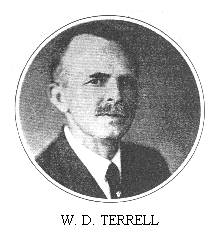Radio Broadcast, October, 1925, pages 743-744:
Guiding the Good Ship Radio
An Interview with W. D. Terrell, Chief Supervisor of Radio, Department of Commerce--The Radio Inspector's Relation to Broadcasting--The Amateur's Service to Radio--Elimination of Interference by Coöperation
By DWIGHT K. TRIPP
MANY people think that the amateur is a boy playing with a toy, and that he serves no useful purpose," says W. D. Terrell, Chief Supervisor of Radio, Department of Commerce. This is a mistaken idea. The licensed amateurs of this country number in their ranks doctors, lawyers, business men, engineers, and, in fact, men and boys of all ages and of all walks of life. Many of our amateurs are men who are seriously interested in the development of radio, and the boys, through their amateur training, develop into the most successful commercial operators. As amateurs these boys learn to adjust their sets properly, make repairs, receive messages under the most difficult conditions, and become generally self-reliant.
They proved their value to this country as a reserve force during the late war. As a rule, they are law-abiding, unselfish, and anxious to cooperate with our branch of the government service to the fullest possible extent. This country has long appreciated their worth and it has extended to them privileges not enjoyed by the amateur of any other country. Recently, I am glad to say, other countries have begun to take a more liberal view of their activities."
Through the energies of the radio amateur, many new and wonderful discoveries have been made, among the most important of which was the discovery a short time ago that short wavelengths are more efficient than the longer ones. Through the use of wavelengths as low as three-quarters of a meter, amateurs have recently conducted two-way conversations over hitherto unheard of distances.

"The radio inspection service," says Mr. Terrell, "has done much for the amateur, by explaining that much of the interference attributed to the amateur by the broadcast listener, is, in fact, caused in some other way. Last winter, many complaints of amateur interference through the Middle West and in the Great Lakes region were received. Investigation by the inspection service disclosed the fact that nearly all of this interference was caused by commercial ship stations operating in the Atlantic Ocean and in the Gulf of Mexico. At that time, ship stations were permitted to use 666 kilocycles (450 meters) well within the broadcasting band. The situation was serious, and when it was brought to the attention of the Secretary of Commerce, a regulation was issued prohibiting the use of that wavelength by ships, assigning to them instead a wavelength of 706 meters (425 kc.)."
The first radio regulation was inaugurated in June, 1910, for the purpose of enforcing the installation of wireless equipment on certain passenger-carrying vessels. Since that time the Radio Inspection Service has developed into one of the most important branches of the Department of Commerce. Under the Act of 1910, the Secretary of Commerce and Labor organized on July 11, 1911, the Radio Service of the Bureau of Navigation. A subsequent Act, approved in 1912, stipulated that all vessels navigating the ocean or the Great Lakes and carrying fifty or more persons, including passengers and crew, be equipped with radio.
An Act to Regulate Radio Communication was approved in August, 1912. Under this Act, transmitting stations and radio operators are licensed by the Department of Commerce.
THE RADIO POLICE
JUST as Ariel, in the fables of the Middle Ages, was a spirit guardian of the air, so in this day of wireless, the Radio Inspector, a modern Ariel, stands a silent watch over the ether. But though he may be silent and, indeed, an angel, he is far from a fable, as those who attempt to dispute his wavemeter soon find out. For the Radio Inspector, ready at all times to be of assistance to those who need him, is essentially a traffic officer of the air, and to him falls the tedious duty of directing the myriad of amateur, commercial, experimental, and broadcasting stations under his jurisdiction.
"The Radio inspector's work," Mr. Terrell continues, "enables the broadcast listener to receive programs without unnecessary interference. This is accomplished in part by the careful adjustment of broadcast transmitters to their assigned frequencies and to a constant inspection of these transmitters to insure their remaining so adjusted.
"The careful adjustment of commercial and amateur transmitters accomplishes the same results. Readjustments are necessary whenever it is found that one station is heterodyning another because of a slight change in the adjustment of the transmitter.
"Investigations of complaints of interference caused by electrical devices other than radio transmitters, such as, for instance, leaky power lines, magnetos on telephone lines, x-ray and violet-ray machines electrical precipitation plants, and so forth, are not controlled by the present radio law, but many of such sources of interference are eliminated through cooperation.
"Radio Inspectors frequently give short talks to audiences in the cities which they visit concerning the problems which they encounter in their work, as well as the problems of the listeners-in.
AND WHAT ABOUT THE FUTURE?
THE Radio Inspection Service has helped the commercial operator to maintain a high standard of excellence by providing examinations for commercial operators which only well qualified men have been able to pass. The results have been gratifying, for in the many cases of disaster to ships at sea, not one case has been reported where the commercial operator has failed to observe the orders of the master of the vessel, has failed to show the highest courage, or has failed to remain at his post until his duties have been fully performed."
No, the task of the Radio Inspector is not an easy one nor does it promise to be easier in the future. But as for the radio future, we can safely say that it will take care of itself, for it is in exceedingly competent hands.
